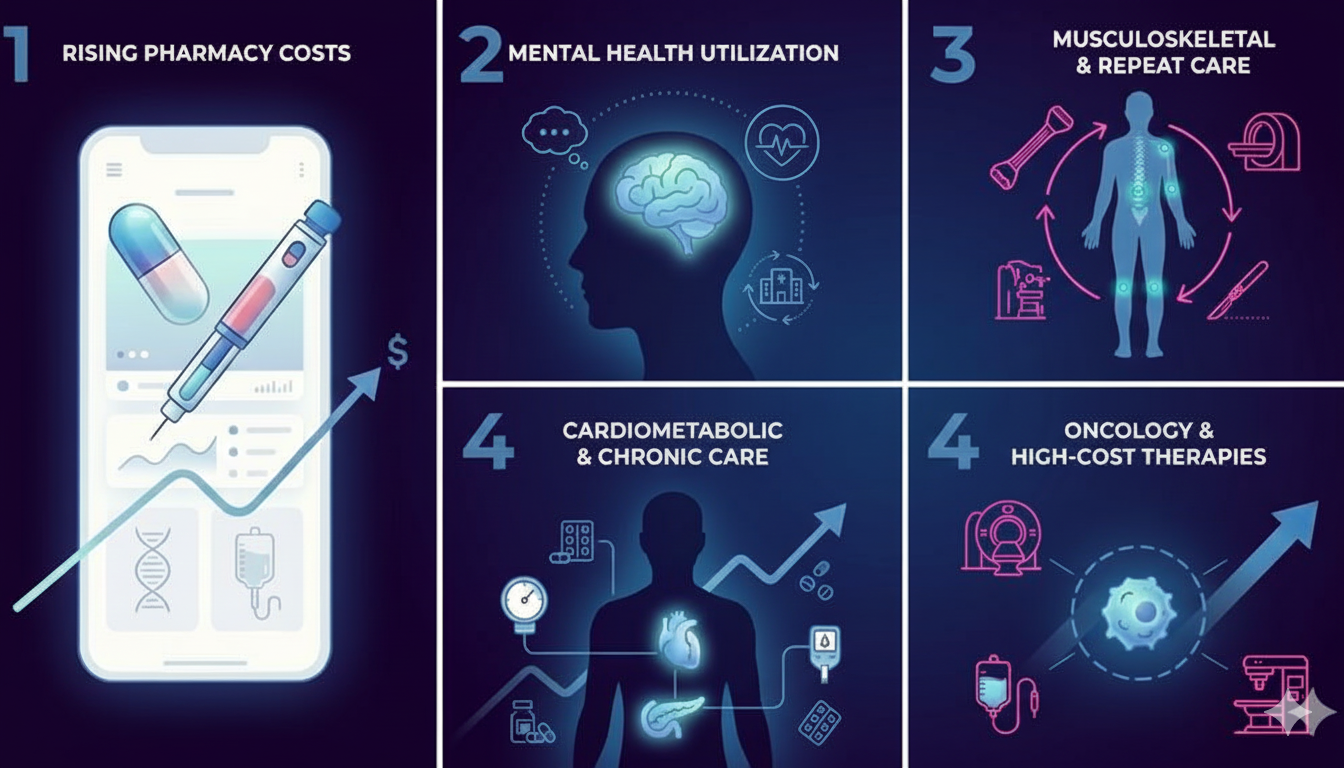Numerous studies have shown that providing perks to employees is crucial to increasing their potential value and guaranteeing their financial stability. They support well-informed job choices and life event planning. Benefits are a major factor in over 60% of workers' loyalty to their employers.
"Why knowing your employee benefits essential?" is a question that resonates deeply with employers striving not only to attract top talent but also to foster a workplace where both employees and the organization thrive.
Having a comprehensive awareness of the entire breadth of your employee benefits is essential in today's workforce. Utilizing opportunities for wellness and personal growth not only gives you an advantage in future job negotiations but also helps you stay healthy.
These perks frequently go beyond health insurance to include retirement programs, financial aid for school, and other things. Every one of these is essential to your total pay package.
Knowing your employee perks is therefore important as you proceed in your career because they play a big role in employee satisfaction.
What Exactly Is an Employee Benefits?
Benefits for employees play a significant role in any salary package. They can lower stress levels, increase financial savings, and enhance the general well-being of staff members.
Benefits for employees can also help firms attract and keep top personnel, which can boost output and profitability.
Employees rate the majority of the leading corporations, including Facebook, Google, Microsoft, Adobe, and so forth, at the highest levels.
These businesses are renowned for their excellent work environments, attractive benefits packages, and competitive pay.
A wide range of benefits are also provided, including flexible work schedules, free food, and on-site gyms. These businesses are therefore able to draw in and keep top talent.
Employee Benefits In The Workplace
The nature and scope of employee benefits have evolved significantly along with the workplace.
Benefits packages, which were formerly only utilized to entice top personnel in a cutthroat market, are now an essential component of employee retention plans and a representation of corporate culture.
This development highlights their increasing significance in the contemporary workplace and the requirement for employees to remain informed about these developments.
Types Of Employee Benefits
Employee benefits encompass a wide range of offerings to meet the diverse requirements of the workforce. While these factors or benefits can vary depending on the company and managerial body, the following are some of the key options.
Let's take a closer look at the common types:
The Impact Of Benefits On Employee Engagement
Knowing the entire range of perks that are accessible to employees is a critical, yet frequently underestimated, factor in determining their level of engagement in any given firm. Extensive and effectively conveyed perks are essential for promoting commitment and job satisfaction; they go beyond simple pay.
Let's examine how a competitive benefits package may energize employees, draw in and retain top talent, and foster a positive, psychologically sound work environment.
Boosting Employee Morale And Productivity
Benefits for employees play a big role in raising morale and productivity. Employees who are aware of their benefits, which include health insurance, retirement programs, and chances for professional growth are more likely to feel appreciated by their employers.
An appreciative staff is more aggressive and engaged. Studies have indicated that when employees are confident that their welfare is taken care of, they become more motivated and perform better on the job overall.
Attracting And Retaining Talent
For most firms, the capacity to draw in and keep great workers is a make-or-break situation. Employee benefits are the main attraction here.
A competitive benefits package helps organizations stand out to potential employees and is a critical difference in the labor market. Benefits are essential for keeping employees on board in addition to luring in new talent.
perks received by employees are frequently positively correlated with long-term job satisfaction, indicating the critical role these perks play in retaining talent inside the organization.
The Psychological Aspect: Security And Well-being
It is impossible to exaggerate the relationship between benefits and workers' psychological health. Benefits like disability insurance, life insurance, and wellness programs that protect against unanticipated events in life provide security.
Workers may focus on their work-related duties without being unduly distracted by worries about what might happen if life takes an unexpected turn because to this foundation of security.
When workers feel safe and at ease at work, they are more engaged and contribute to the corporate culture.
N.B: Companies with high employee engagement have a clear purpose, invest in employee development, and create an open and trusting culture.
How Can You Understand Your Benefits Package?
Recognizing your strengths is a crucial step in enhancing the value of your work, and the benefits package plays a significant role in this process. It is crucial to your long-term financial security in addition to having an immediate impact on your happiness and job satisfaction.
Workers need to know everything available to them. With this information, they can make decisions that will benefit their whole future, as well as their health and finances.
Adequate Knowledge On Benefits
Gaining a comprehensive understanding of your job perks can significantly improve your quality of life. Making strategic use of what's available can result in:
- Better budgeting since you understand the savings and costs associated with perks.
- Enhanced health management achieved by making full use of available services for dentistry, medicine, and mental health.
- Improved work-life balance through the use of remote work options and flexible scheduling, when available.
- Making the best use of possibilities for growth, such as professional development courses or educational support.
How To Evaluate And Compare Benefits?
While there are various ways to assess the benefits of your company, some of the fundamental aspects remain the same. Here is how you can go about it:
- Begin by listing all the benefits your employer offers.
- Then, quantify their value based on your personal and family needs.
- Research industry standards to compare your benefits with those offered by other companies.
- Don't hesitate to ask HR for details or clarification on complex topics such as life insurance or disability coverage.
In addition to these processes, navigating the intricacies of health insurance and retirement plans can be overwhelming. Keep these tips in mind:
The Impact Of Benefits On Employee Engagement
How To Use Employee Assistance Programs (EAPs) Effectively?
Employee Assistance Programs (EAPs) are a hidden gem in many benefits packages, offering access to invaluable resources:
Guidance Services
.jpeg)
As a helpful addition to employee benefits, counseling services provide assistance in coping with stress, depression, and other mental health conditions.
These services usually entail having access to licensed experts, including psychologists or counselors, who offer employees confronting personal or professional difficulties discreet support.
The intention is to support mental health and give staff members a tool to deal with life's challenges, both at work and outside of it.
Legal Counsel
Access to legal counsel is frequently provided as part of employee benefits packages. This is a useful tool for handling individual legal issues that could otherwise result in high expenses.
Employees can use this benefit to meet with attorneys on matters pertaining to family law, estate planning, or other private legal matters.
Employers hope to enhance overall employee well-being and peace of mind by arming their staff with the information and support necessary to handle legal complications through the provision of this service.
Financial Planning
The goal of financial planning services is to help staff members build a more stable financial future. Access to financial experts who may offer advice on investing, retirement planning, budgeting, and other areas of personal finance is part of this service.
Employers understand how important it is to support employees in making financially wise decisions, which is why they provide financial planning assistance.
As a result, the workforce's general financial well-being is enhanced, encouraging stability and confidence in handling money concerns both now and in the future.
How To Maximize Your Benefits?
Comprehending and optimizing your employer-provided perks can significantly influence your general financial well-being and work contentment. Employees frequently ignore or underuse these services, which could result in the loss of important resources.
In addition to improving your short-term financial situation, making the most of your benefits can help you achieve your long-term objectives. By making the most of your benefits package, you're positioning yourself for success on the job and in your personal life.
Strategies For Utilizing Benefits Effectively
Do a thorough annual assessment of your benefits package to make sure you're getting the most out of your employee benefits. Think about the following tactics:
- Remain educated: Remain informed about any modifications to your benefits and comprehend how they correspond with your present requirements.
- Enroll in every relevant program: These could be retirement plans, health insurance, or wellness initiatives.
- Utilize services for preventative care: Several health plans provide these at no additional cost.
- Think of an FSA (flexible spending account): This can lower your taxable income and pay for any out-of-pocket medical expenses.
Professional Development Opportunities
Sustained professional development is essential for career advancement. Take advantage of the following when it comes to employee benefits:
- Tuition assistance programs Financial aid for further study is provided by numerous organizations.
- Workshops and internal training: Take advantage of the chance to pick up new technology or skills.
- Coaching and mentoring services offered: Find mentorship programs to help you on your professional journey.
Work-life Balance Enhancements
Advantages that support a healthy work-life balance are extremely valuable. Seek for benefits like:
- Flexible work hours: Arrange your schedule to best accommodate obligations to your personal life.
- Options for working remotely: When feasible, avoid making the daily commute to save time and money.
- Employee assistance programs: These can improve general well-being by providing support for personal matters.
The Legal And Negotiation Aspects Of Employee Benefits
Although these benefits are tempting, the real strength is in knowing the associated legal positions and negotiation opportunities.
Understanding employee perks isn't merely a routine; it's a crucial element of professional development. Employee packages commonly incorporate health insurance, retirement programs, paid time off, and additional perks.
Your Legal Rights And Entitlements
It is important to be fully aware of your rights and entitlements when navigating the legal environment surrounding employee benefits. A framework for employee benefits is provided by several federal, state, and municipal legislation, including the Affordable Care Act (ACA) and the Family and Medical Leave Act (FMLA). There are particular requirements for eligibility, coverage, and safeguards under each of these statutes.
- Examine the advantages that are required by law to determine which ones apply to you.
- Keep up with the minimal requirements for benefits in your field and area.
- If your benefit worries are complex, think about consulting a lawyer.
Negotiating Benefits During Job Offer Discussions
Don't pass up the opportunity to haggle over your benefits when a job offer is made. Benefits may make up a sizable amount of your overall pay, so negotiating well might result in substantial gains. The following are tactics for successful bargaining:
- Prepare yourself by learning about the usual packages offered by the business.
- Express your demands clearly, giving top priority to the advantages that are most important to you.
- Explain why you are a valuable employee and how better perks will help both of you flourish.
Staying Informed On Changes And Legislation
In response to new laws, policies, and economic circumstances, employee perks are regularly adjusted. You may avoid missing out on better terms or breaking new regulations by staying up to date with these developments.
- A few suggestions for staying informed are: Signing up for newsletters from reliable HR and legal resources.
- going to workshops and seminars about the rights and advantages of employees.
- Talking about updates that pertain to your firm with your HR department.
Challenges And Solutions In Benefit Communication
Comprehending employee benefits is essential for a company's overall success as well as the welfare of its workforce. Employee satisfaction and retention rates can rise when benefits are communicated clearly and effectively, allowing employees to take full use of the advantages provided.
However, many organizations face major problems in properly communicating this knowledge. This section explores these issues and offers doable remedies.
Common Misunderstandings About Benefits
Employees may misunderstand their benefits as a result of poor communication or incomplete information. This could lead to the improper use or mishandling of priceless resources. Typical mistakes consist of:
- Assuming qualification without verifying the details.
- Inaccurate cost or contribution calculations brought on by intricate plan structures.
- Neglecting significant perks like flexible work schedules or mental health help.
Organizations need to make sure that information is clear and easy to understand in addition to providing accurate information to counteract these misconceptions.
Role Of HR in Educating Employees
Human Resources departments play a pivotal role in bridging the gap between complex benefit plans and employee understanding. The HR team can:
- Host informative sessions about benefits.
- Create detailed guides and FAQs.
- Provide one-on-one consultations to address individual concerns.
These efforts can help demystify benefits and promote a culture of informed decisions within the workplace.
Effective Communication Strategies
Benefits communication needs to be multichannel and consistent in order to be successful. Think about putting the following into practice:
Embracing Technology For Benefit Management
Benefits management has been transformed by technological innovations. By using these resources, one can: Offer benefits information on-demand.
- Provide interactive platforms so that workers may virtually see their benefit packages.
- Utilize automated systems to expedite the enrolling process.
Investing in technology not only makes benefits administration easier, but it also lets workers know that their employer appreciates accessibility and efficiency.
Frequently Asked Questions
Why Does Examining Employee Benefits Matter When Applying for Jobs?
Because employee perks improve total remuneration, promote work-life balance, and increase job satisfaction and security, it is critical to evaluate them. A good benefits package can have a big impact on health and financial security.
Why Is It Vital To Examine Your Benefits Package As An Employee?
Examining your benefits package for employees helps you stay competitive, attract and retain talent, and meet the needs of your workforce. It's essential for maintaining current with industry norms and increasing job satisfaction.
Is It Vital To Know The Worth Of Benefits An Employer Provides To Its Staff?
Employer benefits are important to understand because they affect people's general well-being, financial security, and job happiness. It makes it possible to make well-informed choices regarding job offers and professional advancement.
Why Is It Vital That Workers Understand Their Benefits?
To optimize utilization and appreciation, which can improve morale, retention, and overall job satisfaction, employees should be aware of their benefits. Benefits awareness helps with individual financial planning and guarantees that staff members make the most of their resources.
Conclusion - Why Knowing Your Employee Benefits is Essential?
In wrapping up our discussion, one fundamental question echoes: Why is knowing your employee benefits essential? The answer lies in the transformative impact it has on both employers and employees. It is the linchpin for a harmonious workplace, a motivated workforce, and strategic organizational growth.







